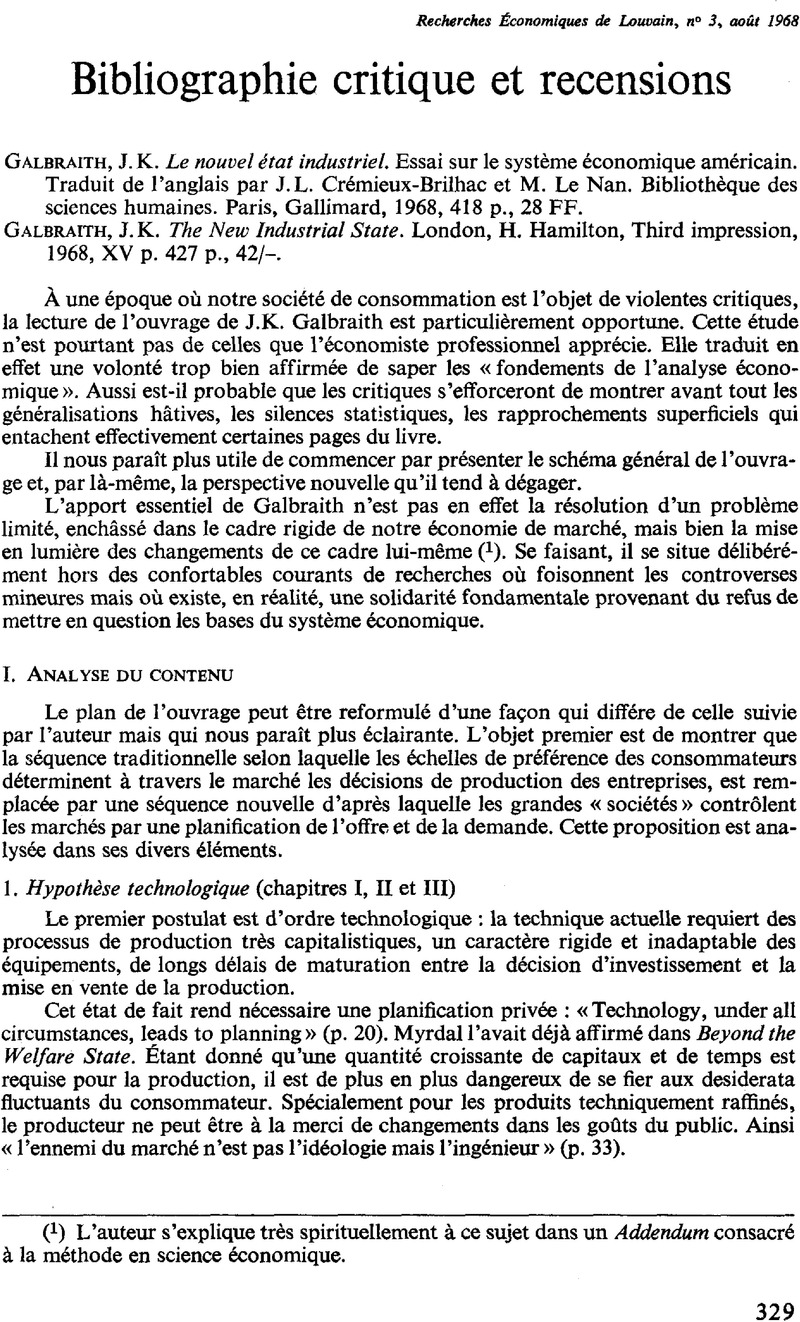No CrossRef data available.
Article contents
J.K. Galbraith, Le nouvel état industriel. Essai sor le système économique americain. Traduit de l'anglais par J.L. Crémieux-Brilhac et M. Le Nan. Bibliothèque des sciences homaines. Paris, Gallimard, 1968, 418 p., 28 FF. - J.K. Galbraith, The New Industrial State. London, H. Hamilton, Third impression, 1968, XV p. 427 p., 42/-.
Review products
Published online by Cambridge University Press: 17 August 2016
Abstract

- Type
- Bibliographie critique et recensions
- Information
- Recherches Économiques de Louvain/ Louvain Economic Review , Volume 34 , Issue 3 , August 1968 , pp. 329 - 333
- Copyright
- Copyright © Université catholique de Louvain, Institut de recherches économiques et sociales 1968
References
(1) L’auteur s’explique très spirituellement à ce sujet dans un Addendum consacryé à la méthode en science économique.
(2) L’entreprise et son pouvoir de marché, Louvain, Librairie universitaire, 1967, p. 44.
(3) Baumol, W., Business Behavior, Value and Growth, Londres, New-York, Macmillan, 1959.Google Scholar
(4) Marris, R., The Economie Theory of Managerial Capitalism, Glencoe, Free Press, 1964.CrossRefGoogle Scholar
(5) Kaysen, C., The Corporation in Modern Society, Mason, E.d., Harvard University Press, 1959.Google Scholar
(6) Ce thème est repris de son précédent ouvrage: The Affluent Society.
(7) Meade, J., Is the New Industrial State Inevitable? Economic Journal, juin 1968.CrossRefGoogle Scholar Galbraith a d’ailleurs prévu cette attitude et critique ceux qui admettent le changement des principaux éléments du système sans vouloir accepter pour autant un changement du système (p. 395).
(8) Baran, P. et Sweezy, P., Monopoly Capital, New-York, Monthly Review Press, 1967.Google Scholar
(9) Houthakker, H.S., Are there Laws of Consumption, to be published in Proceedings of the Econometric Society.CrossRefGoogle Scholar
(10) C’est la position de Katona, G. dans: Consumer Behavior: Theory and Findings on Expectations and Aspirations, American Economic Review, mai 1968, p. 29.Google Scholar
(11) Voir par exemple Yordon, W., Industrial Concentration and Price Flexibility in Inflation, Review of Economics and Statistics, août 1961; De Podwin, H. et Selden, R., Business Pricing Policies and Inflation, The Journal of Political Economy, avril 1963.Google Scholar
(12) Book review dans l’American Economic Review, mars 1968, p. 244.
(13) Van Rompuy, J., The New Industrial State door Galbraith, J.K., Tijdschrift voor Economie, n° 3, 1968.Google Scholar
(14) Voir par exemple en France les ouvrages de P. MASSÉ sur le Plan, les études du Club Jean Moulin et du groupe 1985.


